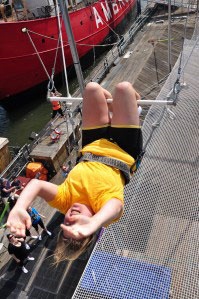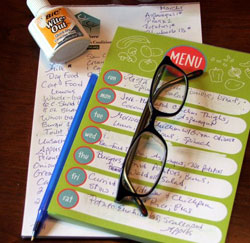 “All that matters is that you jump.”
“All that matters is that you jump.”
One of my trapeze instructors whispers this to me as I am suddenly about to swing off a platform that feels as though it is miles from the ground.
I take a deep breath, bend my knees and then leap-I leap for my fears of heights- for my fears of falling - I leap for my friends – for proving that my last turbulent experience dealing with heights hasn’t held me back - and I leap for myself.
And I soar - like a bird. I feel the air rush past my face. I hear for my commands from below. Legs up. See my hands. Let go. Look for Brooklyn. Enjoy the ride. And boy was I enjoying the the ride.
I listen for my commands again – Legs down, and “up,” which in trapeze lingo means… Drop.
“Awesome,” I proclaim and I get giddy about trying it again.
Trapeze was one of the greatest activities I’ve tried this year. Joined by good friends, I knew that this was the best way to kick off a Saturday morning. And not only was it fun–but it taught me a great lesson as well.
“All that matters it that you jump.”

 A few days before my birthday, a picnic table arrived in our yard, carted down the driveway in Roy’s truck. Roy held out for as long as he could, swearing he was not going to pay money for a picnic table when he could build one for much less, or better yet, build us a really lovely outdoor dining table. I know he was disappointed not to have the time to do it this summer, but at least he didn’t leave us without something to sit around for the birthday gathering.
A few days before my birthday, a picnic table arrived in our yard, carted down the driveway in Roy’s truck. Roy held out for as long as he could, swearing he was not going to pay money for a picnic table when he could build one for much less, or better yet, build us a really lovely outdoor dining table. I know he was disappointed not to have the time to do it this summer, but at least he didn’t leave us without something to sit around for the birthday gathering. When you’re in love, sometimes you fight. It can be said an
altercation or two is inevitable. It is as natural as bugs dying in your
bathroom, flowers losing their bloom in the winter, and food cravings
when you're pregnant. Even domesticated animals like cats and dogs
do it!
When you’re in love, sometimes you fight. It can be said an
altercation or two is inevitable. It is as natural as bugs dying in your
bathroom, flowers losing their bloom in the winter, and food cravings
when you're pregnant. Even domesticated animals like cats and dogs
do it!
 You will be pleased to know that I will not rant, complain, sigh or otherwise indicate my GREAT displeasure with the week that has just passed. Suffice it to say that Mistakes Were Made. I will, instead, look at the good stuff: we ate our first Michigan asparagus of the year, all of the flowering trees are just popping into bloom and looking and smelling so good that it’s almost surreal, the vegetable seeds that Sam and I planted are mostly coming up, I found a fantastic bread recipe, and I got a beautiful box of lemons in the mail from Eric, in San Francisco. (About which more, later). In the TMI department, I started meditating this week and found that I can sit cross-legged for 20 minutes, and that I can keep random thoughts from intruding about 10% of the time. It may not sound like much, but my mind is a busy place, and I find that my “ohms” are frequently swept away by a recollection of the picture that was taken for my London Tube pass 24 years ago, or musings about which Netflix movie to watch.
You will be pleased to know that I will not rant, complain, sigh or otherwise indicate my GREAT displeasure with the week that has just passed. Suffice it to say that Mistakes Were Made. I will, instead, look at the good stuff: we ate our first Michigan asparagus of the year, all of the flowering trees are just popping into bloom and looking and smelling so good that it’s almost surreal, the vegetable seeds that Sam and I planted are mostly coming up, I found a fantastic bread recipe, and I got a beautiful box of lemons in the mail from Eric, in San Francisco. (About which more, later). In the TMI department, I started meditating this week and found that I can sit cross-legged for 20 minutes, and that I can keep random thoughts from intruding about 10% of the time. It may not sound like much, but my mind is a busy place, and I find that my “ohms” are frequently swept away by a recollection of the picture that was taken for my London Tube pass 24 years ago, or musings about which Netflix movie to watch. We went for a cocktail-hour potluck last week at Paule and Flavia’s place. They’re both architects and they live in a house of their own design in the medieval village of Poreta.
We went for a cocktail-hour potluck last week at Paule and Flavia’s place. They’re both architects and they live in a house of their own design in the medieval village of Poreta.